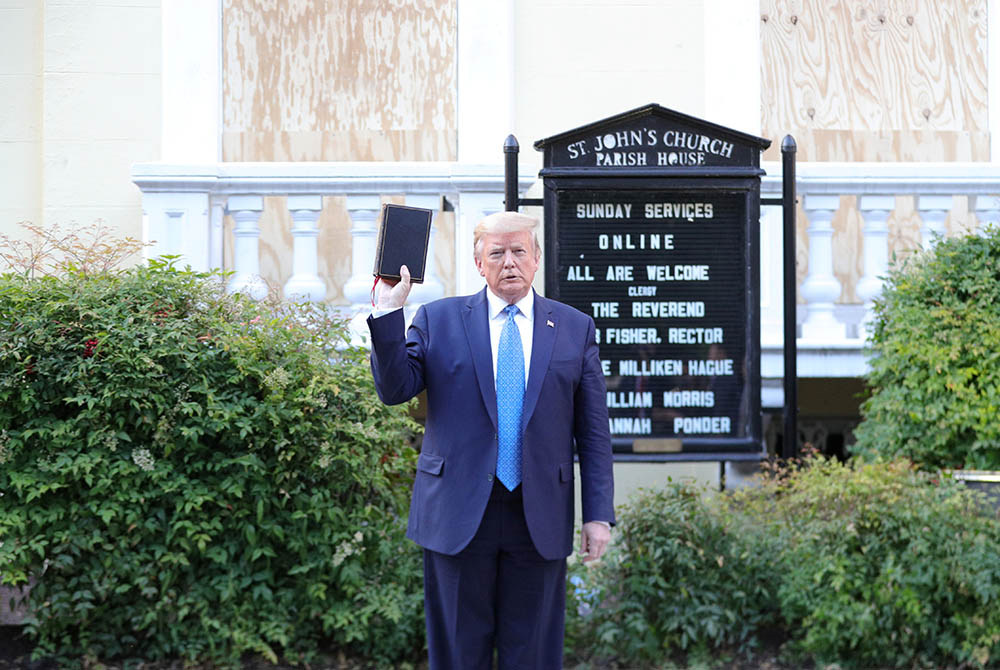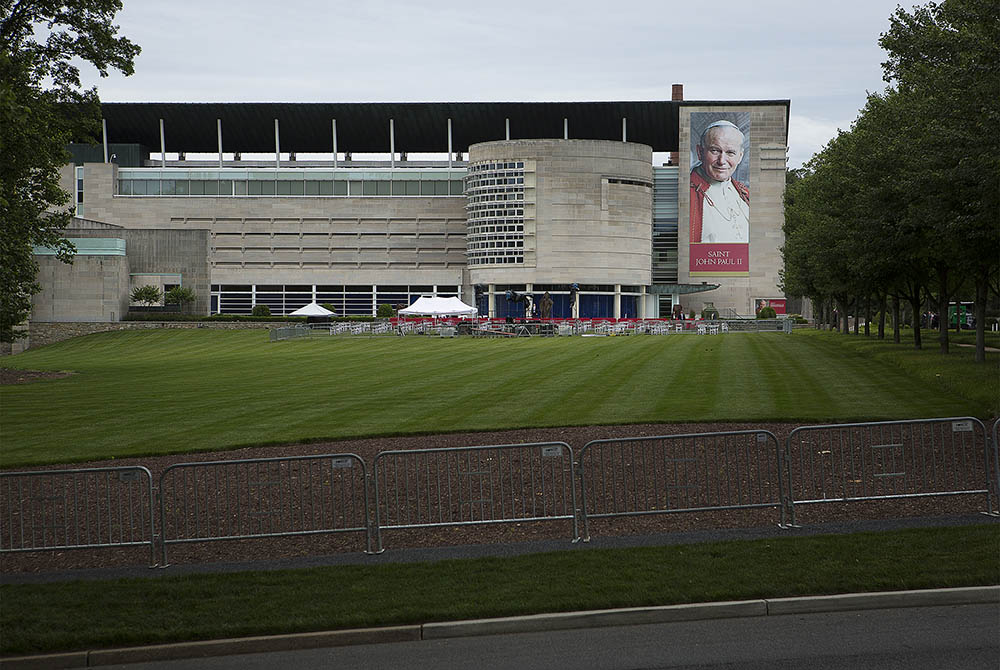
President Donald Trump holds a Bible as he stands in front of St. John's Episcopal Church in Washington June 1. (CNS/Tom Brenner, Reuters)
Did no one think to disinvite him? The president of the United States went to the St. John Paul II National Shrine Tuesday for an event on international religious liberty. He did so the day after police used tear gas to disperse peaceful protesters from the area around St. John's Episcopal Church, so that the president could hold a photo op in front of the boarded-up rectory, part of which had caught fire during protests the night before. The police also forcibly removed the Rev. Gini Gerbasi from the church's grounds before the president smiled for the cameras holding a Bible aloft.
Certainly, simple solidarity with a fellow Christian minister warranted canceling the president's event at the John Paul II Shrine. Certainly, the hypocrisy of holding an event about religious liberty abroad when it had been affronted a block from the White House warranted canceling the president's event at the John Paul II shrine.
Certainly, Washington Archbishop Wilton Gregory made his objections to the president's visit known, issuing a statement the likes of which I have never, ever imagined reading:
I find it baffling and reprehensible that any Catholic facility would allow itself to be so egregiously misused and manipulated in a fashion that violates our religious principles, which call us to defend the rights of all people even those with whom we might disagree. Saint Pope John Paul II was an ardent defender of the rights and dignity of human beings. His legacy bears vivid witness to that truth. He certainly would not condone the use of tear gas and other deterrents to silence, scatter or intimidate them for a photo opportunity in front of a place of worship and peace.
Gregory's stance resulted in a remarkable lack of a photo op: Can anyone remember the president visiting a Catholic church and there not being a bishop there to welcome him?
Just as certainly, the Knights of Columbus owns the John Paul II Shrine, and their Supreme Knight Carl Anderson wasn't going to cancel anything. Anderson cut his political teeth working for Sen. Jesse Helms, the last great segregationist in the U.S. Senate. As Supreme Knight, Anderson has turned the fraternal organization into a culture war battalion and marched should-to-shoulder with the Republican Party, so he was never going to notice the hypocrisy staring him in the face.
One wishes the president had stayed for Mass at the shrine's chapel so he could hear the Gospel of the day: "Knowing their hypocrisy he [Jesus] said to them, 'Why are you testing me?' " The religious leaders in attendance at this travesty failed the test, just like the Herodians and the Pharisees did.

The St. John Paul II National Shrine in Washington is seen June 2. (CNS/Tyler Orsburn)
I sympathize with religious leaders. As we have seen during the pandemic, they are inclined to work with civic leaders to address shared concerns. Now they are being called upon to lend their voices to the calls for a calming of civil strife, for an end to the violence that has erupted this week in the wake of the videotaped murder of George Floyd. But, some of the verbiage traditionally used in such situations get stuck in the throat. For example, what we are watching in our streets is not properly called "senseless violence," as such protests often are called. Looting a store may be a dreadful way to honor the memory of Mr. Floyd, and religious leaders should join with Floyd's family in calling for the looting to stop, but it is an understandable means of expressing rage. No one should excuse looting, to be sure, but understanding the rage is something different.
Catholic leaders need to capture some of the understanding of reactive violence that America's greatest theologian, Abraham Lincoln, displayed in his second inaugural address:
Fondly do we hope — fervently do we pray — that this mighty scourge of war may speedily pass away. Yet, if God wills that it continue, until all the wealth piled by the bond-man's two hundred and fifty years of unrequited toil shall be sunk, and until every drop of blood drawn with the lash, shall be paid by another drawn with the sword, as was said three thousand years ago, so still it must be said "the judgments of the Lord, are true and righteous altogether.
These words are appropriate to the moment our country finds itself in today. The images of rioting and looting are disturbing, but they are not difficult to understand, and it is not wrong to feel empathy with those citizens whose rage has carried them into the streets, angry and relentless. Violence is sometimes a response to a situation that has become intolerable.
Religious leaders are also hobbled in their efforts to get the right message and the right tone in this moment of national crisis by the fact that the president of the United States, who would normally function as a point of national unity, is instead pouring gasoline on the flames. Before his photo-op at St. John's, the president told governors not to appear weak, he threatened to send the U.S. military into the nation's streets to quash the violence, and most repugnantly, he brought up not only the First Amendment but the Second. President Trump has shredded so many democratic norms, introduced so much vulgarity and hatefulness into our politics, those same religious leaders need to ask how much of their own moral authority they are squandering by remaining silent.
On Sunday, Chicago Cardinal Blase Cupich called for national reconciliation:
Other societies have experienced unfathomable offenses against humanity and found ways to engage the history, to admit the crimes, to hold accountable those who committed them and to move toward something resembling reconciliation: the murder of 6 million Jews by the Nazi regime, the Rwandan genocide, the crimes of South African apartheid. We Americans can do this too. We are well past overdue for such a national reconciliation and the need to account for the history of violence against people of color in this country.
The analogy to Germany after the Shoah is stunning, and it is apt. The real reckoning in Germany came down to a question that children asked: "Daddy (or Grandpa), what did you do during the war?" As our Catholic leaders, clerical and lay alike, consider how to cope with Trumpism, they should have that question at the forefront of their mind. Trump may think he can send in the military and imprison every protester, but the bishops of the Catholic Church need to proclaim for all to hear the words of St. Paul's Second Letter to Timothy, Chapter 2, verse 9: "But the word of God is not imprisoned!"
[Michael Sean Winters covers the nexus of religion and politics for NCR.]
Editor's note: Don't miss out on Michael Sean Winters' latest. Sign up and we'll let you know when he publishes new Distinctly Catholic columns.
Advertisement






